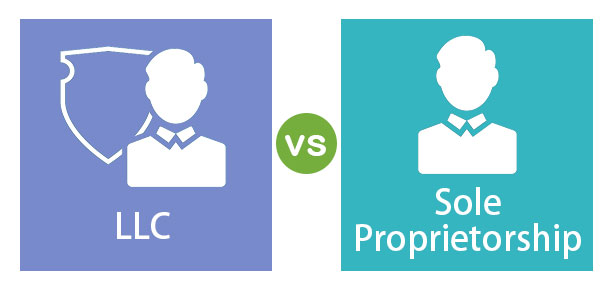Each company structure has benefits and drawbacks. Discover what they are.

When starting a new firm, selecting the correct business structure is crucial. For flexibility and simplicity, many small company owners choose two common business structures: limited liability corporations (LLCs) and sole proprietorships.
Which one you choose will depend on your circumstances, but here are some factors to think about while deciding on a company structure:
Start-up expenses
Government regulations and how they may affect you
Liability insurance
Implications for taxation
Table of Contents
What Is the Difference Between a Limited Liability Company and a Sole Proprietorship?
A limited liability corporation is a state-created legal entity. An LLC operates independently of its owners, who are referred to as members. Members, on the other hand, are not individually liable for the company’s debts and obligations. Instead, the LLC is in charge.
A sole proprietorship is an unincorporated business that is owned and operated by a single individual. This is the simplest construction available, with no mess and no bother. You are entitled to all of the company’s earnings.
However, unlike an LLC, you are personally liable for all liabilities.
What Are the Differences in Management Structure?
A limited liability company (LLC) may be owned by one or more members. An LLC is normally managed by its members, although they may alternatively designate a management to handle day-to-day operations.
An operating agreement is a legal document that details the membership of an LLC and how it will be administered.
In a sole proprietorship, you are actually the boss, and you make all of the decisions. There are no partners or members to worry about.
What About Personal Liability Insurance?
When it comes to corporate debt collection or other claims if your firm is sued, your personal assets are deemed hands-off with an LLC. Creditors often cannot seize your house, vehicle, or personal bank accounts.
There is no distinction between you and the company with a single proprietorship. You are entitled to all earnings, as well as all debts and liabilities. You may even be held liable for obligations incurred by your workers.
Can You Combine Business and Personal Finances?
Legally, sole entrepreneurs do not have to worry about combining company and personal accounts. They are considered one and the same in the eyes of the law. Most specialists, though, still advise against the practise.
You must be cautious with an LLC to maintain banking records and monies distinct from your personal records and cash. If you violate this regulation, you may lose your limited liability protection.
Is it necessary to register your company name?
State regulations for LLCs include mandatory phrases that must be included in an LLC name, such as “LLC” or “limited liability company” at the end of an LLC’s name. Registering your LLC protects your name inside your state.
Sole proprietors are not subject to the same regulations. If the business owner intends to operate under a corporate name rather than their own, they must register for a “fictitious business name,” or DBA (“doing business as”), in their home state.
What Are the Tax Consequences of Different Business Structures?
By default, an LLC’s earnings are only taxed once. This is referred to as pass-through taxes. The tax burden belongs to you as the owner and is passed through to your personal tax return.
To file taxes, you must submit Profit or Loss From Business (Sole Proprietorship) (Form 1040, Schedule C) together with your personal 1040 tax return to disclose your operational results, including profit or loss. An LLC is very adaptable and may be taxed as a single proprietorship, partnership, or corporation.
As a single proprietor, you will also benefit from pass-through taxes, so you will report your business’s revenue and loss in the same manner. The distinction is that you do not have the option of filing as a company.
You are also exempt from paying taxes on the whole amount of your single proprietorship’s revenue. Instead, you will only pay taxes on your company’s profits.
How to Make Each Structure Work for Your Company
Forming an LLC requires filing articles of organisation, also known as a certificate of organisation, with the state. State requirements differ.
An LLC operating agreement is often drafted to describe the rights and obligations of the members and management.
You can also plan to submit specific paperwork with your state government, generally the Secretary of State, and pay an initial filing cost of $50 to $500. In most states, LLCs must also submit yearly or periodic reports and pay a filing fee.
If you operate under your own name, unlike an LLC, no official action is necessary to start your sole proprietorship. If you wish to use a different name, you must apply for a DBA.
You may also be required to get any required licences or permissions, which vary by location, state, and industry.
Whether you choose the liability protection and flexibility of an LLC or the less formal, limitless control of a sole proprietorship, you now have the information you need to make a better educated choice for your company and your future.
